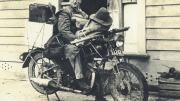“I did not learn to read until I was 16, neither could I spell,” says William G.R. Marden ’46, of Bryan, Texas. “I knew I had a brain with blind spots, dead areas, holes, where there is just zero function.”
He was born in New York City in 1922. His mother, a nurse from New Zealand, died when he was 13, and he and his two younger siblings went to live with their grandmother on the North Island of New Zealand on a farm where she raised thoroughbred race horses and 5,000 sheep.
Officials at his elementary school hadn’t heard of dyslexia (and neither had he). They concluded that he was mentally retarded and would be of more use tending sheep, he says, than wasting their time and patience trying to pass the school certificate examination.
He spent his days on horseback, riding the hills, looking for ewes needing assistance lambing. He cut the throats of sheep he could not help, skinned them, and threw the still-warm skins on his horse. He did a lot of dreaming. His grandfather, Francis A. Marden, graduated from Harvard in 1863, and his father, Francis S., in 1888. Young Marden dreamed of going to Harvard to learn about science. “The impossibility of it all never really entered my mind. Three cheers for youth,” he says now. “Sometimes it does not know its limitations, and I hope it never will.”
He has written a memoir of his early years, “La Réalité Surpasse la Fiction,” and judges himself “the luckiest man in the world.” He rode his old motorcycle to Wellington, begged passage on a ship to San Francisco, hitchhiked to Cambridge, and presented himself to the head of admissions, Richard M. Gummere. Dean Gummere asked if he had taken any Latin. Marden said he had a good background in animal husbandry, sheep farming, wool classing, butchering, and general agriculture and could ride any horse you could find him. Gummere said Marden had almost a month before the mandatory SAT tests and should study physics and chemistry. He did miserably on the tests. Several weeks later he learned that, due to the war, Harvard would have a special intensified summer school starting the next day. He rushed back to Gummere and asked to enroll in first-year physics. “Let’s see what you can do,” said the dean.
The head of the physics department himself, Edwin C. Kemble, Ph.D. ’17, tutored Marden in algebra and calculus. He worked 18 hours a day. He passed. Gummere let him register as a regular student.
With time off to become a 90-day-wonder officer in the Navy and to serve on a wooden minesweeper in the South Pacific, Marden by 1948 had completed all that he needed to graduate except the language requirement. No language requirement, no degree, pronounced Dean Charles W. Duhig ’29, A.M. ’32. He assigned Marden a doubled-up French course. A stream of Fs followed. For the first time, no matter what Marden did, he failed. He left Harvard, sans degree, and went to France to learn the language the way a child would, by ear. He worked as a farmhand.
He got a job in a French laboratory doing biological research with horse pituitary glands and earned a Diplôme des Études Superieures from the Sorbonne in 1951, followed by a master of science from Cambridge University in ’52. Along the road—perhaps through the intervention of registrar Sargent Kennedy ’28, to whom Marden had fired off letters from France—Harvard broke its vow and awarded him a degree. He was a pioneer. It was not until 1963 that the College adopted a stated policy excusing students with pertinent physiological disabilities from the language requirement.
Marden and his wife now spend nine months of the year as stud breeders of Red Brangus cattle and three months sailing and chartering up and down the Caribbean in their 52-foot yacht. They make a point of calling at the islands where French is spoken.









